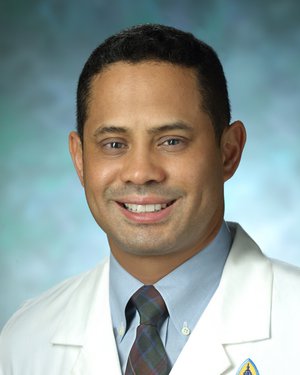Research Lab Results
-
Molecular Mechanisms of Cellular Mechanosensing (Robinson Lab)
The Robinson Lab studies the way in which mechanical stress guide and direct the behavior of cells, including when they are part of tissues, organs and organ systems. -
Christine Durand Lab
Dr. Christine Durand, assistant professor of medicine and oncology and member of the Johns Hopkins Kimmel Cancer Center, is involved in clinical and translational research focused on individuals infected with HIV and hepatitis C virus who require cancer and transplant therapies. Her current research efforts include looking at outcomes of hepatitis C treatment after solid organ transplant, the potential use of organs from HIV-infected donors for HIV-infected solid organ transplant candidates, and HIV cure strategies including bone marrow transplantation. Dr. Durand is supported by multiple grants: • R01 from the National Institute of Allergy and Infectious Diseases (NIAID) to study HIV-to-HIV organ transplantation in the US. • K23 from the National Cancer Institute (NCI) to study antiretroviral therapy during bone marrow transplant in HIV-1 infection. • U01 from the NIAID to study HIV-to-HIV deceased donor kidney transplantation. U01 from the NIAID to study HIV-to-HIV deceased donor liver transplantation.
-
Brendan Cormack Laboratory
The Brendan Cormack Laboratory studies fungal pathogenesis, particularly the host-pathogen interaction for the yeast pathogen Candida glabrata. We are trying to identify virulence genes (genes that evolved in response to the host environment) by screening transposon mutants of C. glabrata for mutants that are specifically altered in adherence to epithelial cells, in survival in the presence of macrophages and PMNs. We also screen mutants directly in mice for those unable to colonize or persist in the normal target organs (liver, kidney and spleen). We also focus research on a family of genes--the EPA genes--that allow the organism to bind to host cells. Our research shows that a subset of them are able to mediate adherence to host epithelial cells. We are trying to understand the contribution of this family to virulence in C. glabrata by figuring out what the ligand specificity is of different family members, how genes are normally regulated during infection, and what mechanisms normally act to keep the genes transcriptionally silent and how that silence is regulated.
-
David Moller Lab
Research in the David Moller Lab focuses on sarcoidosis, a potentially fatal inflammatory disease characterized by tiny clumps of inflammatory cells that scar the lungs, lymph nodes, skin and other major organs. We’re currently involved in a clinical trial related to genomic research in sarcoidosis and a clinical trial related to genomic research in Alpha-1 antitrypsin deficiency. Previously, we led a project that identified a potential protein trigger responsible for sarcoidosis. -
Kunisaki Lab
The Kunisaki lab is a NIH-funded regenerative medicine group within the Division of General Pediatric Surgery at Johns Hopkins that works at the interface of stem cells, mechanobiology, and materials science. We seek to understand how biomaterials and mechanical forces affect developing tissues relevant to pediatric surgical disorders. To accomplish these aims, we take a developmental biology approach using induced pluripotent stem cells and other progenitor cell populations to understand the cellular and molecular mechanisms by which fetal organs develop in disease.
Our lab projects can be broadly divided into three major areas: 1) fetal spinal cord regeneration 2) fetal lung development 3) esophageal regeneration
Lab members: Juan Biancotti, PhD (Instructor/lab manager); Annie Sescleifer, MD (postdoc surgical resident); Kyra Halbert-Elliott (med student), Ciaran Bubb (undergrad)
Recent publications:
Kunisaki SM, Jiang G, Biancotti JC, Ho KKY, Dye BR, Liu AP, Spence JR. Human induced pluripotent stem cell-derived lung organoids in an ex vivo model of congenital diaphragmatic hernia fetal lung. Stem Cells Translational Medicine 2021, PMID: 32949227Biancotti JC, Walker KA, Jiang G, Di Bernardo J, Shea LD, Kunisaki SM. Hydrogel and neural progenitor cell delivery supports organotypic fetal spinal cord development in an ex vivo model of prenatal spina bifida repair. Journal of Tissue Engineering 2020, PMID: 32782773.
Kunisaki SM. Amniotic fluid stem cells for the treatment of surgical disorders in the fetus and neonate. Stem Cells Translational Medicine 2018, 7:767-773


